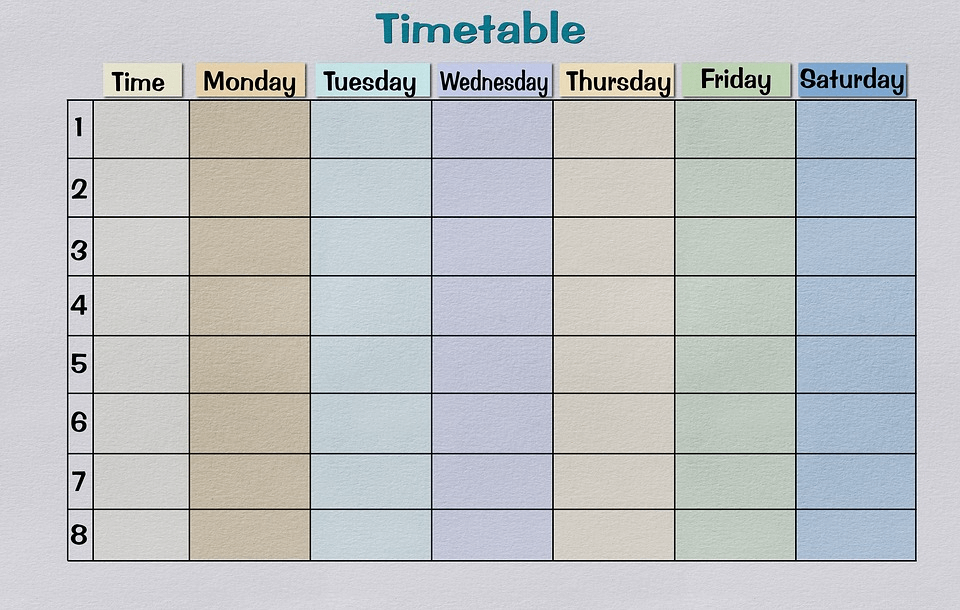Time management is one of the skills that can benefit everyone. With the ability to organize your day both at work and at home, you’ll be able to enjoy your free time more and be on top of your tasks at your job.
When it comes to professional life, time management and scheduling are very important. You can help your team increase its productivity and complete projects without stress. The improvements that a good schedule brings to the workplace are immense.

While a third of the people use to-do lists to manage their goals and tasks at their workplace, others use their inboxes or note apps. All of these methods vary in effectiveness but finding the app that suits you the most will require some trial and error.
I’ve written this article to help you and your team increase their productivity by giving you some of the most efficient scheduling tips.
Contents
1. Online work schedules are the future
Regardless if your company is remote, hybrid, or entirely in an office, it’ll help you heaps if you make a work schedule online. With one of these, you’ll be able to implement some of the tips below with ease.
An online schedule can help both individuals and teams handle their tasks. There are many free solutions to do this. For example, you can utilize Google Sheets or Google Agenda without paying a cent. These platforms can be used on multiple devices, and they can be shared with the whole team.
There are some limitations to free online schedules, but they’re a great starting point.
2. Develop a consistent team schedule

Every task can be completed if you and your team are putting in the effort consistently. By working on something daily, you become more familiar with it, and you’ll be able to do it more efficiently. However, it’s easy to point out this obvious fact, but it’s much harder to embrace consistency and work at high levels daily.
To make sure that your team can work on a project consistently, you need to analyze how much time you have at your disposal and if every employee is accessible at a certain time. You can use an online schedule and then organize your employees accordingly.
With an online schedule, you can have real-time access to the tasks of each employee. This will allow them to cooperate consistently and prevent any misunderstandings. A good schedule that can be consistent will help you get over a potential crisis at the workplace. Before or after the scheduled work, the team can proceed with handling urgent matters.
3. Prioritize tasks
Prioritizing tasks can help the team prevent potential stressful situations if they have too many tasks. The best way to approach doing multiple tasks is by prioritizing the task that is considered the most annoying or the hardest.
Once that is off the table, the team will receive momentum, and it will be motivated to tackle easier goals. One-time tasks are easy to categorize and prioritize according to their importance. However, it’s much harder to prioritize large projects that require longer amounts of time.
There are mainly two approaches to prioritizing tasks
- Handling the one with the shortest deadline
- Tackling the tasks that are the most complex
There isn’t a “correct” solution in such cases, and you should do the research on which projects require the most amount of work.
Setting realistic expectations will allow your team to be comfortable with the pace at which their work. Task prioritization can also prevent the team from wasting energy switching from task to task. When the team has a clear list of duties, they will be much less prone to wasting time.
4. Do a time audit

A time audit is one of the most efficient ways of getting an insight into the current state of your schedule. This examination will help you and your team to be better at managing their time and setting more-realistic expectations for the deadlines and the work required.
A time audit is executed by documenting the amount of time that is required for activities at the workplace. Time audit will be more precise if it’s documented over a longer period of time, and you can feel free to measure time for each activity for as long as you want.
However, the essence of a time audit is to make changes to the time scheduling practices once you grasp how the time is being spent at the workplace. This practice will help your team understand what are the common time-wasters at the workplace and which activities require the largest amount of effort to finish.
If the projects or the tasks are hands are something that can repeat in the future, you’ll be able to plan them out more precisely. Time is a limited resource, and it should be appreciated, especially in the workplace.
Time audits should be performed periodically at the workplace to help employees understand which parts of their daily routines require improvement. Overall, this will help the practice of scheduling more efficiently.
5. Schedule fewer tasks at a time
It’s much more important to have one completed task or a project rather than a dozen of projects that are poorly executed. Scheduling more tasks can seem as if you are going to maximize the productivity of your employees. However, employees can feel overwhelmed with many tasks.
Paradoxically, focusing on fewer tasks can help your team perform more work. Some of the benefits of scheduling fewer tasks are:
- Improving the well-being of workers
- Increasing motivation
- It can lead to better work quality
Another essential benefit of scheduling fewer tasks is that it leaves room for emergency tasks and setbacks. Also, if a specific project requires more work or resources, the team can adapt to this situation and focus the energy more efficiently. While it might not seem logical at first, there are many benefits to this approach.
6. Set deadlines

Deadlines can be annoying for workers. However, there isn’t a better way of keeping track of when projects should be finished. Each time a deadline is distant, we are certain that we will be able to manage to complete the task. However, breaking the deadline seems like a more realistic option as time progresses.
Depending on the type of work in question, deadlines can vary in their importance. But they should usually be followed by the employees. Breaking the deadlines can lead to a variety of downsides for the business, such as
- Losing Reputation
- Losing profit
- Losing clients or customers
So the team needs to do the work according to the deadlines. To help your team be better at following the deadlines, you can implement a method that will raise awareness of the deadlines.
A weekly or daily reminder of the date until which the work must be completed is the easiest way of achieving this. Also, meetings in which the progress of the project is assessed and the employees analyzed.
Benefits of good scheduling
Good scheduling can bring some important benefits to the workplace. Depending of how well you’ve implemented some of the tips that are in the article, your workers can expect a positive change.
1. Increased work quality
More efficiently managing time will help workers improve their work quality. If they aren’t rushing their work just to submit it before the deadline, they can focus on improving various aspects of it. Good scheduling can also give the employees time to analyze their work and potentially redo it if needed.
2. Stress reduction
Well-being is one of the most important aspects of the workplace. As much as 41% of workers say that stress is making them less productive. With measures to help your employees organize their work better, you are helping them be more productive and less stressed.
Workers appreciate companies that put in the effort to improve the mental health of their workers.
3. Allows long-term progress
Companies that are better at organizing their projects have higher productivity and are in the position to accept new clients and expand their company. If every process at the company is functioning flawlessly and on time, there aren’t many other setbacks that can impact the company.
Once a company develops a schedule that’s respected by all employees, new workers are going to accept this once they start working. Also, if your company is known to respect deadlines and deliver the work on time, new clients can be attracted to this while the current clients are going to be retained.
Learning scheduling can be a game-changer in 2023
If your company has struggled to follow its deadlines in the past, learning how to make better schedules is one of the most efficient ways of spending time this year. While these scheduling tips won’t make every employee do their work as soon as possible, they can put a useful system into place.
The various benefits of an effective schedule can be seen in both employees and in the functioning of the business. Hopefully, the tips mentioned in the article will help you improve your company in 2023.
About Writer

Veljko is a student of information technology that paired his passion for technology with his writing skills. He enjoys researching topics such as robotics and programming and cultivates his knowledge in philosophy, classical literature, and fitness. Veljko’s favorite writers are Borislav Pekić, Miloš Crnjanski, and Ernest Hemingway.
Website: writerveljko.com
Linkedin: https://www.linkedin.com/in/veljko-petrović-699ab0201/



